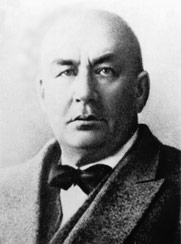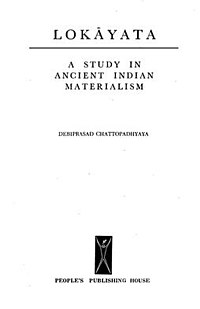
Krishna Chandra Bhattacharya, also known as K.C. Bhattacharya, was a philosopher at the University of Calcutta known for his method of "constructive interpretation" through which relations and problematics of ancient Indian philosophical systems are drawn out and developed so that they can be studied like problems of modern philosophy. He was especially interested in the problematic of how the mind creates an apparently material universe. Bhattacharya encouraged the idea of an immersive cosmopolitanism in which Indian systems of philosophy were modernized through assimilation and immersion rather than through a blind imitation of European ideas.
Charvaka, also known as Lokāyata, is an ancient school of Indian materialism. Charvaka holds direct perception, empiricism, and conditional inference as proper sources of knowledge, embraces philosophical skepticism and rejects ritualism and supernaturalism. It was a popular belief system in ancient India.
Eastern philosophy or Asian philosophy includes the various philosophies that originated in East and South Asia, including Chinese philosophy, Japanese philosophy, Korean philosophy, and Vietnamese philosophy; which are dominant in East Asia, and Indian philosophy, which are dominant in South Asia, Southeast Asia, Tibet, and Mongolia.

Adi Shankara, also called Adi Shankaracharya, was an 8th-century Indian Vedic scholar and teacher (acharya). His works present a harmonizing reading of the sastras, with liberating knowledge of the self at its core, synthesizing the Advaita Vedanta teachings of his time.

Advaita Vedanta is a Hindu sādhanā, a path of spiritual discipline and experience. In a narrow sense it refers to the oldest extant scholarly tradition of the orthodox Hindu school Vedānta, writing in Sanskrit; in a broader sense it refers to a popular, syncretic tradition, blending Vedānta with other traditions and producing works in vernacular.

Hindu philosophy encompasses the philosophies, world views and teachings of Hinduism that emerged in Ancient India which include six systems (shad-darśana) – Samkhya, Yoga, Nyaya, Vaisheshika, Mimamsa and Vedanta. In Indian tradition, the word used for philosophy is Darshana, from the Sanskrit root drish.
Mīmāṁsā is a Sanskrit word that means "reflection" or "critical investigation" and thus refers to a tradition of contemplation which reflected on the meanings of certain Vedic texts. This tradition is also known as Pūrva-Mīmāṁsā because of its focus on the earlier (pūrva) Vedic texts dealing with ritual actions, and similarly as Karma-Mīmāṁsā due to its focus on ritual action (karma). It is one of six Vedic "affirming" (āstika) schools of Hinduism. This particular school is known for its philosophical theories on the nature of dharma, based on hermeneutics of the Vedas, especially the Brāḥmanas and Saṃhitas. The Mīmāṃsā school was foundational and influential for the vedāntic schools, which were also known as Uttara-Mīmāṁsā for their focus on the "later" (uttara) portions of the Vedas, the Upaniṣads. While both "earlier" and "later" Mīmāṃsā investigate the aim of human action, they do so with different attitudes towards the necessity of ritual praxis.

Indian philosophy refers to philosophical traditions of the Indian subcontinent. A traditional Hindu classification divides āstika and nāstika schools of philosophy, depending on one of three alternate criteria: whether it believes the Vedas as a valid source of knowledge; whether the school believes in the premises of Brahman and Atman; and whether the school believes in afterlife and Devas.
The Buddhist doctrine of the two truths differentiates between two levels of satya in the teaching of the Śākyamuni Buddha: the "conventional" or "provisional" (saṁvṛti) truth, and the "ultimate" (paramārtha) truth.

Debiprasad Chattopadhyaya was an Indian Marxist philosopher. He made contributions to the exploration of the materialist current in ancient Indian philosophy. He is known for Lokayata: A Study in Ancient Indian Materialism, which is his exposition of the philosophy of Lokayata. He is also known for work on history of science and scientific method in ancient India, especially his 1977 book Science and Society in Ancient India on the ancient physicians Charaka and Sushruta. He was awarded the Padma Bhushan, India's third highest civilian honour, posthumously, in 1998.

Fyodor Ippolitovich Shcherbatskoy or Stcherbatsky, often referred to in the literature as F. Th. Stcherbatsky, was a Russian Indologist who, in large part, was responsible for laying the foundations in the Western world for the scholarly study of Buddhism and Buddhist philosophy. He was born in Kielce, Poland, and died at the Borovoye Resort in northern Kazakhstan.
Ajita Kesakambali was an ancient Indian philosopher in the 6th century BC. He is considered to be the first known proponent of Indian materialism, and forerunner to the Charvaka school. He was probably a contemporary of the Buddha and Mahavira. It has frequently been noted that the doctrines of the Lokayata school were considerably drawn from Ajita's teachings.
Professor Debi Prasad Chattopadhyaya, was educated at the University of Calcutta and was Deputy Minister of Health of India and Union Minister of Commerce and Industry. He founded the Indian Council of Philosophical Research, New Delhi, and served as its Chairman. Till the end of his life, he served as the Chairman of the Centre for Studies in Civilizations, and General Editor of the Project of History of Indian Science, Philosophy and Culture, which produced a multi-volume cultural history of India.
Jayarāśi Bhaṭṭa was an Indian philosopher known for his radical skepticism who most likely flourished between 800-840 probably in southern India. He was the author of one of the most extraordinary philosophical works in Indian history, the Tattvopaplavasiṃha in which he professed radical skepticism, which posits the impossibility of knowledge. In his work, he attempts to show the contradictions of various philosophical positions as well as the counter positions. He is loosely affiliated to the materialist Cārvāka/Lokāyata school of philosophy but his affiliation with charvaka is disputed among scholars. He has been differently classified as a sceptic, agnostic or materialist atheist.
Prabhākara was an Indian philosopher-grammarian in the Mīmāṃsā tradition of Kerala.
Uddalaka Aruni, also referred to as Uddalaka or Aruni or Uddalaka Varuni, is a revered Vedic sage of Hinduism. He is mentioned in many Vedic era Sanskrit texts, and his philosophical teachings are among the center piece in the Brihadaranyaka Upanishad and Chandogya Upanishad, two of the oldest Upanishadic scriptures. A famed Vedic teacher, Aruni lived a few centuries before the Buddha, and attracted students from far regions of the Indian subcontinent; some of his students such as Yajnavalkya are also highly revered in the Hindu traditions. Both Aruni and Yajnavalkya are among the most frequently mentioned Upanishadic teachers in Hinduism.

Swami Vivekananda (1863–1902) was an Indian Hindu monk and a key figure in the introduction of Indian philosophies of Vedanta and Yoga to the western world. He was one of the most influential philosophers and social reformers in his contemporary India and the most successful and influential missionaries of Vedanta to the Western world. Indian Nobel laureate poet Rabindranath Tagore's suggested to study the works of Vivekananda to understand India. He also told, in Vivekananda there was nothing negative, but everything positive.
Parā Vidyā is a combination of two words – parā, in Hindu philosophy, means - existence, paramount object, the highest point or degree, final beatitude; and vidyā means - knowledge, philosophy, science, learning, scholarship. Para Vidya means – higher learning or learning related to the Self or the Ultimate Truth i.e. transcendental knowledge. Vedanta affirms that those who gain the knowledge of the Self attain kaivalya, they become liberated, they become Brahman.

Ramkrishna Bhattacharya was an academic author and exponent of an ancient school of Indian materialism called Carvaka/Lokayata.

Marietta Stepanyants is a Russian philosopher, the founder and the Chairholder of the UNESCO Chair in “Philosophy in the Dialogue of Cultures” and the Chief Research Fellow at the Institute of Philosophy, Russian Academy of Sciences. She is an Honored Scholar of the Russian Federation and an active member of the Academy of Humanities since 1995.










